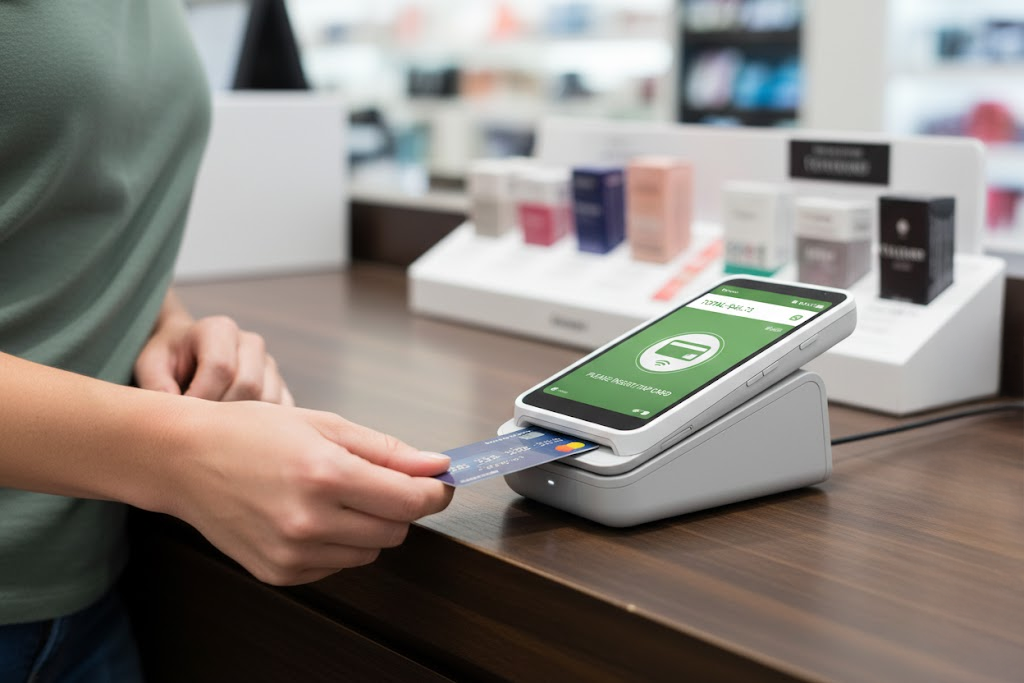
Dojo Card Machine: Independent UK Guide for Businesses
What Is a Dojo Card Machine? A Dojo card machine is a payment terminal supplied as
Get a quote in seconds with our simple form
Last updated 20/01/2026
While taking card payments unlocks a lot of potential for your business, no advantage comes with zero cost. The company that provides you with your card machine, payment gateway, and merchant account will charge a fee for using their service. These fees are usually paid as a slice of each card payment your business takes, which is why they’re called card processing fees, but there are also other monthly fees, like card machine rentals, that can crop up every month regardless of how many payments you take.
In many cases, all of the aspects of the payment-taking process can be provided by a single company. In other cases, different companies will manage different aspects of the transaction process; your card machine will not necessarily be provided by the same company that provides your payment gateway, for example.
Most of the time, all of the card processing fees are added up and billed to your business at the end of the month. They are then deducted from the total amount that your merchant account provider (also called your acquiring bank) sends through to your business bank account. We know what you’re thinking, and yes, they can sometimes be expensive.
Understanding these fees is important for you and your business because it puts you in control when it comes to finding the best deal possible. So, without further ado, let’s dive into our breakdown of card processing fees.
The first thing to remember is that fees vary from business to business. Some businesses will have to pay more or higher fees than others due to factors like their credit history, industry, number of transactions, or the contract they have with their acquiring bank. All of these things are highly nuanced, and your business’s total cost will be dependent on all of them.
The second thing to remember is that, while your monthly card processing bill will be delivered as one lump sum, there are actually several different types of charges that your business will pay each time you take a card payment. These fees all fall into one of the following categories:
Credit card assessment fees are charged by card networks, like Visa, Mastercard, and American Express. They are charged on credit card transactions to cover their operational and processing costs, such as maintaining their infrastructure. They are comparatively small, costing around 0.1%, but something to be aware of nonetheless.
Interchange fees are charges applied between the two banks involved in a transaction. Namely, that’s your bank and your customer’s bank. When a customer pays with a card, your acquiring bank transfers the interchange fee to the cardholder’s issuing bank.
These fees are determined by card networks and are usually a percentage of the purchase amount, plus a fixed fee. The exact fee can vary based on several factors, such as whether the card is credit or debit, whether the transaction is in-store or online, and your business’s industry.
Luckily for you, interchange fees in the UK are capped at 0.3% for credit cards and 0.2% for debit cards. Unluckily for you, processor fees aren’t, and this is where you pay the biggest chunk of your card processing fees.
Card processing fees are paid to your merchant account provider. This is the same as your acquiring bank and the same as your credit card processor. Confusing, we know, but some popular providers include Barclaycard, PayPal, and Stripe.
Typically, the fee includes a per-transaction fee (often a percentage or flat fee, depending on your provider), which starts at around 1.5% and can climb to 3.5% or higher.
The processing fee is usually small in comparison to the actual transaction, but it can add up to significant amounts, especially when you’re accepting card payments exclusively, so keep this in mind when you’re choosing your merchant account. Below is a further breakdown of what processing fees can typically include:
All of the above fees need paying, but to make things that little bit easier, many merchant account providers include these fees within the standard transaction fee that they charge. This is not always the case, however, and some processors do charge a transaction fee + one of the above.
This is in addition to potential other fees, like chargeback fees, refunds, or currency conversions. These fees are always paid by your business to your payment service provider, and you cannot legally pass them onto the customer as a surcharge.
Please select the industry that you trade within. This information allows us to tailor your quote.
All of the above means one thing: there is no easy way to know how much you will pay in fees for your merchant account. Indeed, many factors influence your final bill, and it can be tricky to know how your circumstances will ultimately affect your bill. There are, however, some broad assumptions you can make about how much you will pay for your merchant account.
If you are a larger business and process more payments, you may get more favourable rates. Small businesses typically get charged more and are unable to be as picky as larger ones, which is why it’s important to think carefully about who to choose as your merchant account provider, as making the right choice now saves you money in the long run.
Likewise, businesses that operate in a high-risk industry are also exposed to the risk of higher fees, as are businesses with a bad credit history. In these circumstances, it can be difficult to have your application for a merchant account accepted, and many businesses like this tend to look for options like PayPal, which is a merchant account that doesn’t perform credit checks.
Merchant account fees are often all bundled into one type of payment. One of the most important things that will influence the price you pay is the type of pricing model you choose. These pricing models are broken down below.
Also known as cost-plus pricing or pass-through pricing, an interchange-plus pricing model breaks down your fees into two parts. The first part is the interchange, which is the cost from the issuing bank to you via your acquiring bank. This includes the interchange fee and the assessment fee. The second part only includes the processor fee.
The interchange plus model means you can see the breakdown of fees, including the interchange fee and the processor’s markup, so you can see exactly where your fees are going. What’s more, the interchange plus model can often mean lower fees than with other pricing models (explored below). The downside, however, is that, given the variety of fees charged for each customer’s transaction, your total fees can be unpredictable.
If the unpredictability of interchange plus pricing is something you don’t fancy, you might prefer to opt for a flat-rate pricing model. With this model, you pay the same fee for every transaction you make. Regardless of the card issuer or card network, the rate you pay will never change.
Similar to when you take out a mortgage, opting for a flat rate or fixed fee will usually mean you pay slightly higher rates, but you do have the advantage of having more predictability when it comes to your merchant account fees.
Finally, there’s tiered pricing, where your transactions are categorised into qualified, mid-qualified, and non-qualified. How they are categorised depends on what card was used and whether it was made online or in person.
The fees you pay are dependent on the categorisation of the transaction, with qualified transactions being the cheapest. Be careful though, as not all of your transactions will be qualified and you could end up spending a lot of other types of transactions.
True to their name, scheduled merchant fees are ones you can always see coming, which makes them nice and predictable. They will be agreed upon between you and your acquiring bank when you first open your merchant account, and will usually be charged monthly.
Common types of scheduled fees include card machine rentals, payment gateway fees, and PCI compliance fees. These fees ensure you can accept card payments easily, smoothly, and safely without putting your business at risk.
PCI compliance rules make sure the sensitive data you’re taking from your customers is handled responsibly. The rules are especially important when it comes to protecting your business against fraud and reputational damage, and most merchant account providers will provide this kind of protection as standard. Other providers charge an additional fee.
If you take payments without PCI compliance, then you could be subject to heavy fines, or your provider may remove your ability to take card payments altogether.
Then they’re card machine rentals, which are fairly self-explanatory. Companies like Square and Sumup charge little to no rental fees on their card machines, while other providers charge up to £20 or more per month.
Payment gateway fees pay for your payment gateway (the bit of the payment processing that enables money to flow from your customers to you). While mainly associated with online payments, in-person payments also often use a payment gateway, so you’re likely to be subject to a fee, however you take your payments. These fees are usually a fixed per-transaction fee or a percentage fee.
Unlike scheduled fees, you can’t always see incidental fees coming, which can make them the most inconvenient of all the types of fees explored here. These fees are usually paid on a one-time basis when something happens to incur them. This could be a refund fee (incurred when you have to refund a customer – usually a fixed fee), a chargeback fee (triggered when a customer is wrongly charged), or an early termination fee, where you leave your contract early.
The size of the fee you have to pay in situations like the ones described above will depend on what triggered the fee, with some costing significantly more than others. On the plus side, incidental fees can usually be mitigated.
The type of pricing structure you choose is up to you, but there are some broad observations to be made. One is that interchange plus pricing is popular among small businesses as it can often mean smaller fees. Another one is that a flat rate pricing structure offers more predictability, which can also suit smaller businesses that depend on fees being manageable.
In the end, it’ll be up to you, so being as informed as possible is a good place to start.
You can take numerous measures to ensure you’re saving as much as you can on your merchant fees. Doing things like implementing strategies to minimise chargebacks and refunds, ensuring customers receive accurate and detailed order information, and getting quotes from multiple payment processors to find the most competitive rates can all save you money.

What Is a Dojo Card Machine? A Dojo card machine is a payment terminal supplied as

What Are Stripe Payments? Stripe Payments is a payment processing service provided by Stripe that allows

Your business needs a card machine that’s suited to you and your customers: here’s our breakdown




CommercialExperts.com helps savvy UK businesses to save time and money by comparing a wide range of essential products and services.
© TFLI 2025 All rights reserved. Licenced by the Information Commissioners Office, (Registration Number Z3585914) Registered in the UK, number 08424810. Registered Office Address: First Floor, Beechwood Court, Springwood Way, Tytherington Business Park, Macclesfield, Cheshire. SK10 2XG.